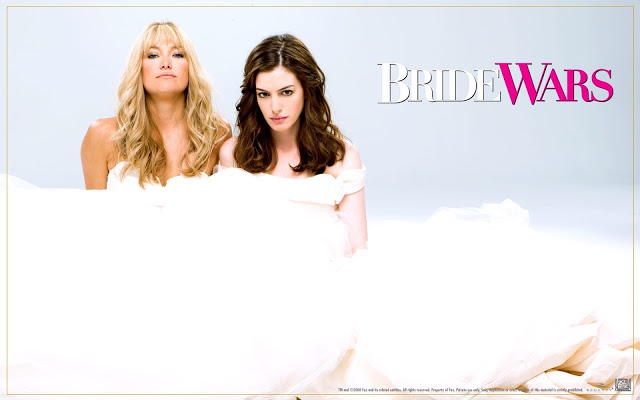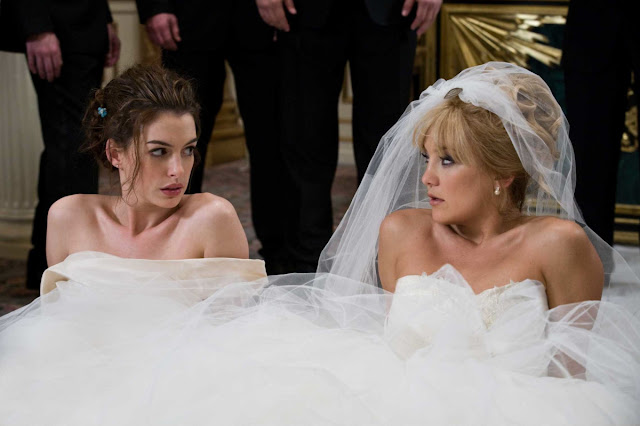This is a guest post by Ece Okar.
This movie is a chick flick that plays on horrible female stereotypes, and I can easily say it’s one of the most sexist chick flicks ever produced. Usually when I think of these types of films, I think of a romantic comedy about a couple that slowly falls in love. There will be some problems of course, to keep the movie enticing, but in the end everyone lives happily ever after. Bride Wars takes two best friends that grew up together and turns them into feral enemies when they both have their wedding dates accidentally scheduled on the same day. Don’t get me wrong–I love chick flicks as much as the next person–but a majority of the time this movie just made me cringe. As I watched, I thought, “I hope that society doesn’t think we, as women, are this shallow and materialistic to rage out on our close friends like this.”
The movie’s opening scene is when Liv (Kate Hudson) and Emma (Anna Hathaway) are young kids pretending to get married. Emma plays the groom, the masculine role, and Liv plays the pretty, feminine bride. Emma asks when she can pretend to be the bride, and Liv replies she will always play the bride, and Emma should remember that. This first scene immediately exposes which character is stronger and which is weaker. As the movie progresses, there are more signs to show Liv’s strengths and Emma’s weaknesses. It is very evident when we first see them in their respective careers: Liv is in a board room discussing with many male lawyers that they need to take the aggressive approach and expose the other parties’ weakness and do whatever to win their case. And then we see Emma as a sweet middle-school teacher who gets walked all over by her co-workers. These scenes foreshadow how Liv and Emma do everything they can to take down a best friend that they’ve known for 20 years because, I mean, who wouldn’t fuck up a 20-year relationship because of one “important” day that society has ingrained in every little girl’s head.
As the movie progresses both characters are molding into their respective roles–Liv as the tyrant and Emma as the doormat. One interesting point is that since their days of playing dress up they have switched roles. Emma became soft-hearted lady who thinks about others, and Liv went from being the pretty, dainty bride to an aggressive and persistent woman; these characteristics are unfortunately always described as masculine traits. The day comes when Liv finds a Tiffany blue box, and both friends freak out and celebrate. Liv tries to act happy, but it’s clearly evident that she is mad, and Emma–being the rug everyone walks on–says sorry…sorry for getting proposed to first. Liv, of course, being the aggressive and impatient character, immediately goes to her boyfriend’s work and confronts him about not proposing. Yay, now both best friends are engaged to their significant others! Planning goes well for a few scenes; they are actually happy and supportive of each other, but then the notorious wedding planner explains to them her secretary made a mistake and scheduled both their weddings on the same day. At this point they are still a team, let me remind you, but when they can’t get another bride (who happens to be one of the film’s writers…I wouldn’t put this movie on my resume) to change her date, things start to go awry.
Their first fight is at a party with mutual friends, and they have a big nasty spat. They start reminding each other of their fat and loser days as a way to compete with who is the better person. It’s detrimental that these are the ways that the two women fight with each other–exploiting their eating habits and social skills to make the other feel bad. Now they start sabotaging each other; Emma sends sweets to Liv to get her fat so she won’t fit into her dress (because as they say in the movie “Vera Wang doesn’t alter for you, you alter yourself for Vera Wang”), and they undermine tanning sessions and haircuts as they both prepare for their nuptials. All of these treacheries are skin deep, illustrating how horrible these two characters are. They put so much emphasis on how they should look, and no significance on how they should treat each other with respect, that it’s just killing any feminist ideal that has ever been thought before this movie. One of the worst lines in this movie, and there are plenty to choose from–but this one will make you grit your teeth from anger–is when the well-known wedding planner tells them, “A wedding marks the first day of the rest of your life; you have been dead until now.” This line probably sums up the movie as a whole, illustrating how ludicrous these women are acting by putting so much emphasis on the idea of being a bride rather than their more important accomplishments. I hope when adolescent girls finish watching this film, they know that who they are as a person is far more important than what society, significant others, and friends think.
There aren’t many characters to like in this movie. Even the friends are annoying. Whenever they hear their friends are engaged, or that positive things are happening for their friends, they each deal with it in a negative way–reaching for pills, binge-eating ice cream, and even fighting with their new husband. Is this how we should celebrate our friends’ happiness? I certainly hope not. I understand humans are innately competitive, but these are much exaggerated examples. I mean, when an exciting thing happens for a friend, one should celebrate by their friend’s side–not seethe with jealousy behind their friend’s back.
There is one redeeming quality in this movie, and that is when Emma–who is a people pleaser for much of the movie–eventually starts to grow a backbone, while Liv–who is pushy and determined–softens up by the end. I’m hoping that the audience can take from these character shifts that women can be both determined and compassionate and that it is not disadvantageous to be both. I do love when Emma gets upset at her fiancé over how he thinks Liv is uncontrollable, indicating that she is not a person that can be dominated. If Emma had laughed it off, I probably would have turned this movie off immediately.
This movie came out in 2009, and there were definitely many horrible reviews, especially about Anne Hathaway ruining her Oscar chances by being in this movie. There is a great quote from USA Today that says, “Bride Wars is about as funny as a cringingly awkward wedding toast. On top of a noticeable lack of humor, it’s absurdly sexist and mired in retro stereotypes. It might as well proclaim up front that all young woman care about is landing their MRS.” And Richard Roeper, a film critic for The Chicago Sun Times and Gene Siskel’s replacement, explains this movie very well:
This is the wrong film for the wrong times. Sure, folks like to go to the cinema to escape their troubles. (Think of all the musicals and frothy comedies that were released during the Great Depression.) But in these dark economic times, watching two gorgeous, skinny, screeching young women battle over their insanely lavish weddings–no thanks. This stuff would have seem tired and sexist 40 years ago, let alone in 2009.
And on IMDB.com, customer reviewers are having discussions on how horribly this movie portrays women, so not everyone in our society believes women act this way in reality. I think this movie should come with a caution sign stating that all characters are exaggerated and should not be reenacted by young girls … so they don’t think afterward that where or when she has her wedding is more important than lifelong friendships.
Ece Okar currently lives in Asheville, NC. She is working part time at a local community college as well as Helpmate, a great nonprofit where domestic violence victims can turn to for counseling, education, and shelter. She is working toward going back to school to get her MSW so she can help people suffering with mental health and substance abuse issues.





